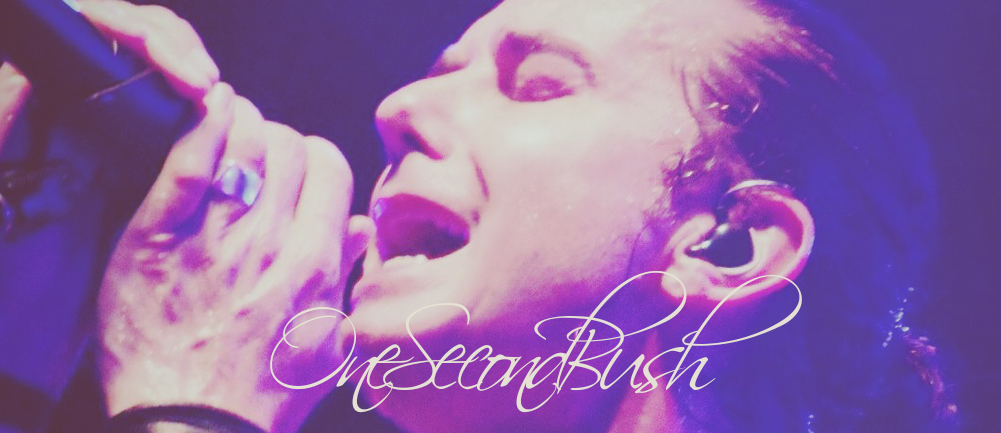by Nisid Hajari
Entertainment Weekly, EW.com
February 26, 1998
FOUR BRITS REVIVE TEEN IDOLATRY BY PUTTING A PRETTY FACE ON GRUNGE
Bush’s burn does have its biblical overtones. At first glance, England’s Great Grunge Hope seems to have turned water into wine: Four hand-to-mouth lads from London sign with a lilliputian American indie, fire off a fist-pumping single (“Everything Zen,” a top 10 hit on both the modern rock and album rock charts), and watch their debut album, Sixteen Stone, afterburn from No. 187 to No. 24 on the pop chart in just two months. But Bush’s emergence as America’s latest rock apostles, in fact, owes as much to the material world as to the spiritual. * “My main objective was never to have a job that lasted more than three weeks,” boasts 27-year-old lead singer Gavin Rossdale of his pre-Bush years. While he gladly unspools his slacker resume (housepainter, video art illustrator, etc.), the doe-eyed, high-cheekboned frontman tactfully neglects to mention that he’s hardly a naif in the industry: His post-Wham! soul-pop ensemble, Midnight, released a lone single in England on Sony U.K. Freed of commitments (and turned on to noisy Yanks like the Pixies and Sonic Youth) after a six-month sojourn across America, Rossdale hooked up with the similarly inclined guitarist Nigel Pulsford, 29, in December 1992; the rhythm section-bassist Dave Parsons, 28, and drummer Robin Goodridge, age 28-joined a few months later.
“We did that slog of playing to very few people in smelly places, then playing to more people in less smelly places,” says Rossdale. But Bush’s obscurity proved short-lived. A friendly Radio One DJ recommended their three- song demo to George Michael’s then manager, Rob Kahane, who needed acts for his recently established Hollywood Records subsidiary, Acme.
“The songs captured the angst of the Seattle sound, and without question, ) in seeing them live, I thought they were stars,” Kahane exults. “The lead singer had a look which was very favorable for marketing and selling records.”
Good call: In February, MTV’s America Online site received more than 200 messages devoted to Bush, most expounding some variation on JpJn 4E’s “Hi! Gavin is the most flyest guy I ever seen. Know (sic) man can compete with him, not even my boyfriend.” Sentiments like that have suddenly forced the foursome to bunker down in their hotel rooms to escape overheated female fans, and they recently earned a “Cute Band Alert” from Sassy. “I think (Gavin worship) is a by-product-” Goodridge begins. “A waste by-product,” Rossdale interrupts, spitting out his words disgustedly.
That assessment may be cavalier. “Every guy in the band is a total babe, and that’s been lacking lately,” says Karen Glauber, a HITS magazine editor. “I think if they were really hard to look at, really super ugly, the album might not have done as well.”
Sixteen Stone solders 11 tracks of that old-fashioned grunge-and-roll- sandblasted guitar leads, left-hook tempo changes, and no-exit lyrics (“We’re so bored/You’re to blame”) delivered in a hybrid of a Cobain screech and a Vedder wail. When the band signed with Acme in ’93, Stone Temple Pilots had proved how profitable aping that form could be. By the time Bush delivered Stone last August, however, new management at Hollywood “told me that not only did they not like the record, but that they didn’t feel ‘we had a record,'” says Kahane.
Cast adrift by Hollywood, Kahane merged Acme into fellow indie Trauma Records, and took a test pressing of Stone to his friend Kevin Weatherly, program director at L.A.’s buzz-brewing radio station KROQ. “There are some people, I’m sure, that wish grunge had never taken hold,” says KROQ’s assistant PD, Gene Sandbloom, “but they’re in a very small minority as far as KROQ goes.”
The station’s enthusiasm (Weatherly actually picked “Zen” as the single) sparked a chain reaction on modern-rock radio, rear-ending Bush into overdrive. Over the weekend of Nov. 12, U2 video director Matt Mahurin shot the “Zen” video at a discount, and after a bidding war, powerhouse Interscope Records signed a joint venture with Trauma so that they could distribute Stone. “MTV wasn’t crazy about the video,” says HITS’ Glauber. But as radio play continued to blossom, “Zen” zoomed out of Alternative Nation and into MTV’s Buzz Bin on Jan. 9; later that month, Bush entered the American pop chart. “(Bush) rocks hard,” says MTV vice president of music Patti Galluzzi. “They’re not so, like, subtle as some of the other British bands.”
Of course, that affinity with the American mainstream spawns charges of mindless mimicry. “There is something familiar about the sound, but that’s the sound kids want-whether it’s Candlebox or Sponge,” says Glauber. “And it doesn’t hurt that there are no other superstar acts on their heels. There’s not a new Soundgarden record or Nirvana or Stone Temple Pilots. We’re at the tail end of these projects, so you need something new.”
Such logic doesn’t sit well with the cognoscenti. “There’s no reason for anybody to try and be art,” rails one Seattle record exec. “You can make perfectly passable music like Bush-that’s also frighteningly derivative-and make a huge living. There’s no motivation for anybody to do anything but make sequels-and all Bush is is a sequel. It’s, like, Nirvana 2: Electric Boogaloo.”
Understandably, the members of Bush cop to the theory, but not to its application. “It’s always the same way,” agrees Rossdale. “As soon as you get bands that do really well and have their individual sound, then that exact next wave is going to try too hard to be like them. Whereas I hope we have a realness behind our success.”
“Seattle’s not a bad place to be linked to, though,” muses Pulsford. “I’d rather that than Blackpool.”
